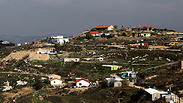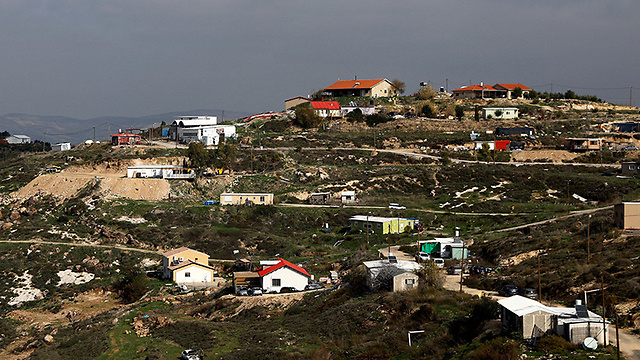
Prime Minister Benjamin Netanyahu said Sunday the government will discuss a proposal to legalize the outpost of Havat Gilad next week, after two consecutive weeks of the issue failing to make the agenda for the weekly cabinet meeting.
Havat Gilad was the home of Rabbi Raziel Shevah, who was murdered in a terrorist attack some two weeks ago. Ministers and right-wing MKs who came to offer their condolences to his widow, Yael, promised to push for the legalization of the outpost.
Five days after the attack, Defense Minister Avigdor Lieberman submitted the proposal to do so to the government, and it has since been waiting for approval.
Bayit Yehudi leader Naftali Bennett and Justice Minister Ayelet Shaked said Wednesday that the attorney general has already approved the proposal, determining there is no legal cause not to bring it to a vote.
Bennett and Shaked signaled to Netanyahu that they expect the proposal to be put on the government's docket this week, but it now appears the illegal outpost would have to wait another week.
Political officials said the discussion on the proposal was further postponed due to "sensitive timing."
Last week, it was likely the visit of US Vice President Mike Pence to Israel that led to the decision not to hold the discussion, while this week's delay is likely due to Netanyahu's trip to Davos for the World Economic Forum and his meeting there with US President Donald Trump.
"Havat Gilad will become a legal community, as is appropriate," Public Security Minister Gilad Erdan wrote on Twitter on Sunday. "It is our moral duty to the brave residents and the family of Rabbi Shevah. I have no doubt the prime minister will fulfill our obligation and that of the defense minister, and the decision will be approved by the government today or next week."
Education Minister Bennett said ahead of the government meeting that his Bayit Yehudi party "expects the prime minister to raise the solution for Havat Gilad today. We will back the prime minister, because promises must be kept."
The Likud Party said in response to Bennett, "This is Bayit Yehudi's well-known method once again at play - demanding the prime minister to do something they know he is going to do anyway, so they could later present it as their achievement. The bill will be raised next week, just as it was agreed with the bill's sponsor, Defense Minister Lieberman."
The proposal will be put to an "executive vote," the first stage of a long and complex process to legalize the outpost.
The "executive decision" is mostly declarative in nature, announcing the government's intention to legalize the outpost, but without detailing the manner in which it will be done.
Havat Gilad is made up of lands privately owned by Jews, undeveloped lands that belong to the state, and undefined land that will likely not remain part of the outpost once it is legalized.
In addition to legally recognizing the outpost, considerable funding will have to be allocated for infrastructure, including roads, street lights and electricity.
The Samaria Regional Council has launched a campaign to pressure the government to legalize the outpost. Among other things, an advertisement paid for by the campaign includes photos of government ministers with comments they made in favor of the legalization of the outpost.

"The legalization and construction of Havat Gilad is the most deterring price that can be exacted from terrorists," Bennett is quoted as saying.
"The State of Israel's response to the horrendous murder of Rabbi Shevah would be the legalization of Havat Gilad," said Shaked.
"We need to legalize Havat Gilad. Citizens here need to live with the same rights and obligations as in Kiryat Shmona and Tel Aviv," said Culture Minister Miri Regev.
"We must legalize Havat Gilad. I have no doubt Havat Gilad will continue growing," said Tourism Minister Yariv Levin.
"I promised Yael Shevah I would do everything to turn Havat Gilad into a regular community," Transportation Minister Yisrael Katz is quoted as saying.


















